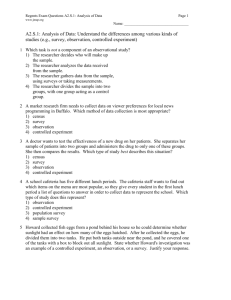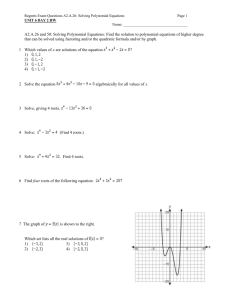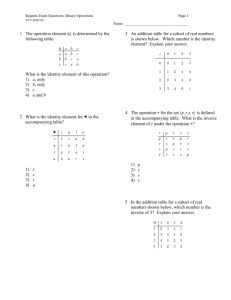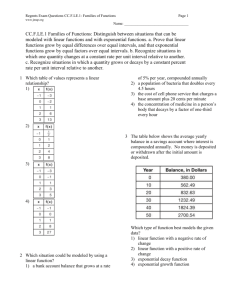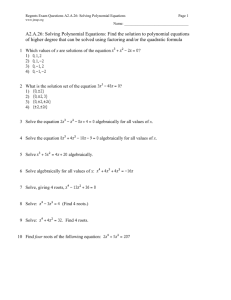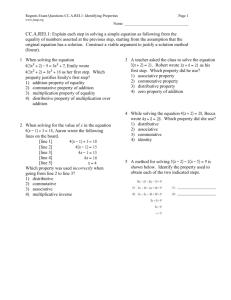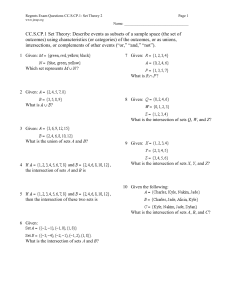What is Psychology?
advertisement
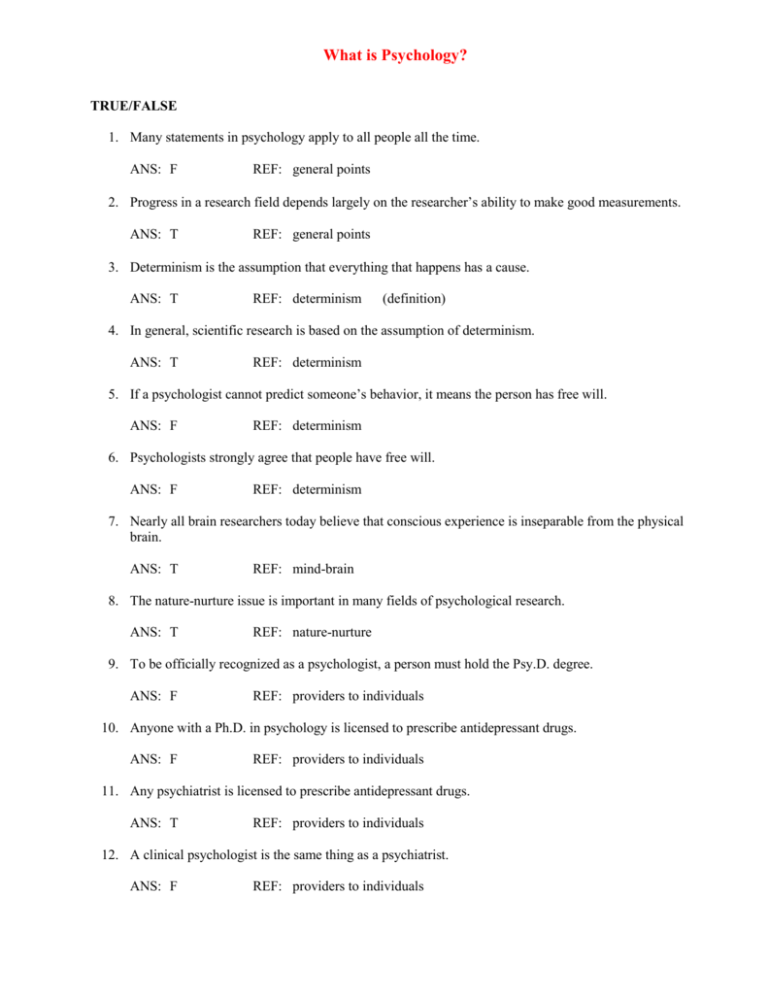
What is Psychology? TRUE/FALSE 1. Many statements in psychology apply to all people all the time. ANS: F REF: general points 2. Progress in a research field depends largely on the researcher’s ability to make good measurements. ANS: T REF: general points 3. Determinism is the assumption that everything that happens has a cause. ANS: T REF: determinism (definition) 4. In general, scientific research is based on the assumption of determinism. ANS: T REF: determinism 5. If a psychologist cannot predict someone’s behavior, it means the person has free will. ANS: F REF: determinism 6. Psychologists strongly agree that people have free will. ANS: F REF: determinism 7. Nearly all brain researchers today believe that conscious experience is inseparable from the physical brain. ANS: T REF: mind-brain 8. The nature-nurture issue is important in many fields of psychological research. ANS: T REF: nature-nurture 9. To be officially recognized as a psychologist, a person must hold the Psy.D. degree. ANS: F REF: providers to individuals 10. Anyone with a Ph.D. in psychology is licensed to prescribe antidepressant drugs. ANS: F REF: providers to individuals 11. Any psychiatrist is licensed to prescribe antidepressant drugs. ANS: T REF: providers to individuals 12. A clinical psychologist is the same thing as a psychiatrist. ANS: F REF: providers to individuals 13. Psychoanalysts use the methods that Sigmund Freud pioneered. ANS: T REF: providers to individuals 14. A human factors specialist (or ergonomist), attempts to facilitate the operation of machinery so that ordinary people can use it efficiently and safely. ANS: T REF: human factors (definition) 15. A psychologist who specializes in making machines easier for people to use is known as an ergonomist or human-factors psychologist. ANS: T REF: human factors (definition) 16. A cognitive psychologist is interested in the processes of thinking and acquiring knowledge. ANS: T REF: cognitive 17. Darwin's theory of evolution has had an important influence on psychology. ANS: T REF: evolutionary 18. Social psychologists are the ones most likely to study the effects of others' expectations on someone’s behavior. ANS: T REF: social 19. Sigmund Freud was the first psychological researcher. ANS: F REF: Wundt 20. William James established the American approach to psychology known as functionalism. ANS: T REF: functionalism 21. One of early psychologists’ main research topics was the relationship between physical stimuli and psychological sensations. ANS: T REF: sensory 22. John Watson and other behaviorists were much more interested in studying animal behavior and learning than in studying mental processes. ANS: T REF: behaviorism 23. During the mid 1900s, many psychologists believed that they could discover the basic laws of behavior by studying the behavior of rats in mazes. ANS: T REF: learning 24. Freud's influence on clinical psychology is stronger today than ever before. ANS: F REF: Freud to modern 25. Women now receive the majority of psychology Ph.Ds in the United States. ANS: T REF: recent trends COMPLETION 1. The current definition of psychology given in the text is the systematic study of ____________________ and ____________________. ANS: behavior, experience experience, behavior REF: introduction 2. The view that everything, including human behavior and experience, follows laws of cause and effect is known as ________________. ANS: determinism REF: determinism (definition) 3. Determinism is generally seen as opposing the concept of _____________ will. ANS: free REF: determinism 4. The philosophical question of how experience relates to the brain is the ____________________ problem. ANS: mind–brain REF: mind-brain 5. What do we call the belief that mental activity and brain activity are the same thing? ANS: monism REF: mind-brain (definition) 6. Understanding the roles of heredity and environment in behavior is known as the _____________ issue. ANS: nature-nurture REF: nature-nurture (definition) 7. The nature-nurture issue is the question of the relationship between heredity and ____________________. ANS: environment REF: nature-nurture 8. A psychotherapist with a Ph.D. degree is a _________ psychologist. ANS: clinical REF: providers to individuals 9. A medical doctor who provides help for psychologically troubled people is a ____ ANS: psychiatrist REF: providers to individuals 10. A psychiatrist has what kind of advanced degree? ANS: M.D. REF: providers to individuals 11. A psychoanalyst uses methods and theories that date back to whom? ANS: Sigmund Freud REF: providers to individuals 12. A psychologist who helps the legal system make decisions about people is a _________ psychologist. ANS: forensic REF: providers to individuals (definition) 13. The psychological study of people at work is known as ____________ psychology. ANS: industrial/organizational I/O REF: industrial/organizational 14. A psychologist who tries to facilitate the operation of machinery so that ordinary people can use it easily is known as an ergonomist or a _______ ________ specialist ANS: human factors REF: human factors 15. A psychologist who studies changes in behavior as people age is a _________ psychologist. ANS: developmental REF: developmental (definition) 16. A psychologist who studies thought and knowledge is a ________ psychologist ANS: cognitive REF: cognitive (definition) 17. A psychologist who studies the ways in which people influence one another’s behavior is a __________ psychologist. ANS: social REF: social 18. Who established the first psychological research laboratory? ANS: Wundt REF: Wundt 19. Wundt set the precedent for studying psychological questions with ____________________. ANS: scientific data or research REF: Wundt 20. To “look within oneself” to try to observe and describe one’s experiences is to _______ ANS: introspect REF: Wundt (definition) 21. Who is credited with being the founder of American psychology, as well as the founder of functionalism? ANS: William James REF: functionalism 22. The mathematical description of the relationship between the physical properties of a stimulus and its perceived properties is called the ____________________. ANS: psychophysical function REF: sensory 23. Someone who studies the behavioral similarities and differences among several species of animals is a ____________ psychologist. ANS: comparative REF: animal intelligence (definition) 24. The type of psychologist who is LEAST interested in discussions of mental events is a _______. ANS: behaviorist REF: behaviorism 25. Clinical psychology greatly increased in prominence after which war? ___________________ ANS: World War II REF: Freud to modern SHORT ANSWER 1. What is the difference between monism and dualism? ANS: Dualism is the belief that mind and brain are separate, such that each could exist without the other. Monism is the belief that mental activity is the same thing as certain types of brain activity. REF: mind-brain (definition) 2. In your textbook, different types of psychologists are organized into two main categories. Describe those two categories and give an example of a specific type of psychologist for each category. ANS: The two categories presented in the textbook are psychologists in research and service providers. Examples of psychologists in research include social psychologists, biological psychologists, cognitive psychologists, specialists in learning, developmental psychologists, or comparative psychologists. Examples of service providers are clinical psychologists, school psychologists, industrial-organizational psychologists, and human factors specialists (ergonomists). REF: what psychologists doOBJ: facts and concepts 3. What are the main differences between clinical psychologists and psychiatrists? ANS: A psychiatrist is a medical doctor (M.D.), and is licensed to prescribe drugs. A clinical psychologist has a Ph.D. or Psy.D. degree (or in some cases a master’s degree) and in most states cannot prescribe medications. REF: what psychologists doOBJ: facts and concepts 4. How did the origin of psychology as a research field differ from the origin of physics, chemistry, and biology? ANS: Physics, chemistry, and biology developed gradually, over centuries, as people who were interested in these topics did research in their spare time. After a vast base of knowledge had been accumulated, people eventually began to identify themselves as professional scientists in these fields. In contrast, psychology began as a deliberate attempt to start a new science, merging the questions of philosophy with the methods of biology. REF: early era OBJ: facts and concepts 5. Explain the difference between structuralism and functionalism. ANS: Structuralists are primarily interested in understanding the structures that compose the mind, or understanding the elements that make up our conscious experiences. Functionalists are more interested in understanding what mental processes do, and what they accomplish. A structuralist might use introspection to understand the elements of an experience (e.g. sensory information) and a functionalist would study the resulting behaviors. REF: early era (definition) 6. Why did the earliest psychological researchers put so much emphasis on sensation? ANS: The early psychological researchers were interested in experience, and all experience results from sensations. Also, questions about sensation seemed easier to research than questions about emotion or personality. It made sense to start with easier questions in order to demonstrate the possibility of even doing research in psychology. REF: early era 7. Might a behaviorist rely on introspection? Why or why not? ANS: A behaviorist would never rely on introspection. A behaviorist distrusts discussion of internal, unobservable mental processes, and prefers instead to concentrate on what a person or animal does. REF: early era OBJ: evaluating
